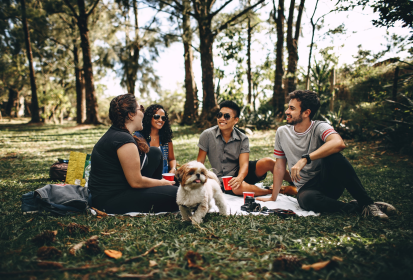Follow these simple first aid tips to keep you and your family safe and prevent unnecessary calls to 911 or trips to the ER.
As we move from spring into summer, hiking, biking, picnics, and camping trips abound. We enjoy spending time with family and friends in the great outdoors enriching relationships and making memories. So make sure you and your loved ones stay safe by following these first aid tips:
Cuts and scrapes
These happen to even the most agile person. Make sure your tend to these as soon as possible to prevent infection.
- Use clean running water to thoroughly rinse the area of any debris.
- Gently wash with soap.
- Pat dry with a clean cloth. If bleeding continues, apply gentle pressure for 5 minutes or so.
- Apply an antibiotic cream and bandage.
If the bleeding won't stop or the wound is deep, seek immediate medical attention.
Heat Exhaustion
Early symptoms include leg cramps, cool/clammy skin, excessive sweating, irritability, headache, nausea or vomiting, and confusion.
- Be sure to drink plenty of fluids before, during, and after physical activities in hot outdoors. Water is good, but isotonic sports drinks are better, such as Gatorade or PowerAde as they help your body retain liquid.
- Take plenty of breaks in the shade to prevent heat illness symptoms from even starting. If you do begin to see symptoms, seek medical attention immediately.
Nosebleeds
It can be a little alarming if you've never experienced them before, but here's what you need to know.
Prevent nose bleeds: It may not be possible to prevent, but here are a few things that may help.
- Keep the inside of your nose moist. Using a cotton swab, gently apply petrolium jelly (or an antibiotic ointment) inside each nostril 3 times a day, including before bed.
- Use a saline nasal spray.
- Use a humidifier.
- Don't smoke.
- Don't pick your nose.
- Try not to use nasal allergy medications too often as these can dry out your nose.
If a nose bleed happens:
- Stay calm. This will help the bleeding stop more quickly as getting nervous or anxious can actually make you bleed more.
- Sit up, don't lie down. You want to keep your head above your heart.
- Lean forward a little. The inclination is to lean your head backwards, don't. Leaning forward keeps the blood
- from draining down the back of your throat.
- Pinch your nostrils closed for 5 - 10 minutes while breathing through your mouth. This pressure may stem the flow of blood.
If the blood doesn't stop after 20 minutes, seek medical attention immediately. Don't take any chances.
Eye injuries
These are very common when spending time outside. Prevent them by using protective eye-wear appropriate to what you're doing, avoid projectile toys, fasten yourself properly in every kind of vehicle, and be very careful when spraying any kind of chemical (such as insect spray, sunscreen, etc.). It may seem annoying, but taking just a few minutes to do these things will save you time and worry in the long run.
If an eye injury occurs:
- Don't touch, rub, or apply any kind of pressure to the eye. This may cause more damage.
- Don't try to remove debris from the eye. Lift the top lid and blink rapidly to see if tears will flush out any particles.
- Only flush with water in the event of chemical exposure.
An opthamologist, family doctor or nurse should be contacted as soon as possible to examine the eye because a serious eye injury isn't always obvious. If medical attention is delayed it can lead to permanent vision loss or blindness. Poisoning should be taken very seriously. It's way better to be safe than sorry, so if you suspect poisoning, call Poison Control immediately - 1-800-222-1222 (available 24/7) or dial 911.
Related Tips
- Get plenty of rest and sleep, to make sure you are functioning at your best.
- Keep a first aid kit available and fully stocked at home and on trips.
- Keep emergency numbers handy and have a cellphone with you at all times.
- Take a CPR and first aid class.
Sources:
5 First Aid Tips for Your Child This Summer


Thanks for these useful tips. This is definitely so helpful to all.
Changing weather or season is crucial in term of health. we have to be careful and face some short of trouble. First aid training can be our best friend on that particular time. Thank for sharing tips regarding that. Thanks